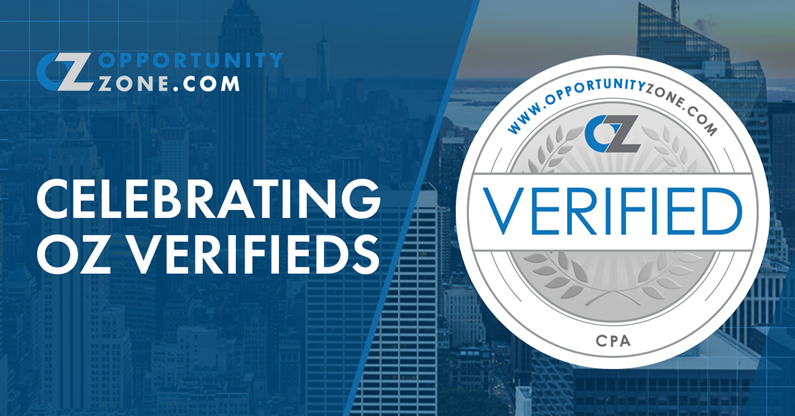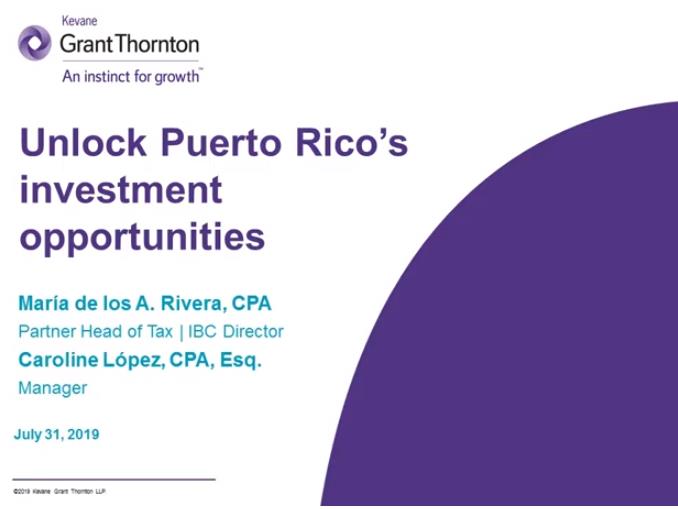As noted on our April 18, 2018 Tax Alert, Puerto Rico was designated as a Qualified Opportunity Zone under the U.S. Tax Cuts and Job Act of 2017 (the “Act”). By providing for short- and long-term capital gains tax deferral and the potential for significant step-up in basis, the Act aims to spur long-term investments in low-income urban and rural communities throughout the U.S. and Puerto Rico by investing in a qualified opportunity fund.
What is a Qualified Opportunity Zone?
Section 1400Z-1(a) of the U.S. Internal Revenue Code of 1986, as amended (the “Code”) states that a population census tract that is a low-income community can be designated as a Qualified Opportunity Zone (“QOZ”). This designation lasts for a period of ten (10) years, commencing on the designation day and ending at the close of the tenth (10th) calendar year beginning on or after the date of designation.
There is a limit to how many census tracts the State can designate – specifically, no more than twenty-five percent (25%) of a State’s low-income communities can be designated as QOZ’s.
To gain the designation, the tract in question must be nominated by the chief executive officer of the State or possession, and notice of said nomination must be submitted to the Secretary of the Treasury (the “Secretary”) of the nomination. After an analysis, the Secretary will certify the nomination and proceed with the corresponding designation. Interestingly enough, pursuant to Section 1400Z-1(b)(3), in the case of Puerto Rico each population census tract that is a low-income community will be deemed as certified and designated by the Secretary as a QOZ.
What is a Qualified Opportunity Fund?
A Qualified Opportunity Fund (the “Fund”) is defined by Section 1400Z-2(d)(1) of the Code as any investment vehicle that is organized as either a corporation or partnership for the sole purpose of investing in a qualified opportunity zone property.
The Fund must hold at least ninety percent (90%) of its assets in qualified opportunity zone property on both (i) the last day of the first 6-month period and (ii) the last day of its taxable year to be considered as a Qualified Opportunity Fund.
What constitutes Qualified Opportunity Zone Property?
Pursuant to Section 1400Z-.2(d)(2) of the Code, there are three (3) kinds of Qualified Opportunity Zone Property:
-
Qualified Opportunity Zone Stock
Stock that is acquired by a Fund after December 31, 2017 at its original issue from a Qualified Opportunity Zone Business solely in exchange for cash. Moreover, the corporation must qualify as a qualified opportunity zone business during substantially all of the Fund’s stock holding period.
-
Qualified Opportunity Zone Partnership Interest
Partnership interest that is acquired by a Fund after December 31, 2017 at its original issue from a Qualified Opportunity Zone Business solely in exchange for cash. Moreover, the partnership must qualify as a qualified opportunity zone business during substantially all of the Fund’s partnership interest holding period.
-
Qualified Opportunity Zone Business Property
Namely, tangible property employed in the trade or business that is acquired by a Fund after December 31, 2017 and it is either first put in use by the Fund or substantially improved by it. It is important that during substantially all of the Fund's property holding period, substantially all of the use of the property is within a qualified opportunity zone.
What is a Qualified Opportunity Zone Business?
According to Section 1400Z-2(d)(3), a Qualified Opportunity Zone Business is any a trade or business in which substantially all of its tangible property –be it owned or leased – is qualified opportunity zone business property. Furthermore, the Qualified Opportunity Zone Business must comply with the following:
- at least fifty percent (50%) of its total gross income must be derived from the active conduct of a qualified business within a Qualified Opportunity Zone;
- a substantial portion of the business’ intangible property must be used in the active conduct of a qualified business within a Qualified Opportunity Zone;
- less than five percent (5%) of the average of the aggregate unadjusted bases of the business’ property must be attributable to non-qualified financial property; and
- the business cannot be a private or commercial golf course, country club, massage parlor, hot tub facility, suntan facility, racetrack or other facility used for gambling, or any store the principal business of which is the sale of alcoholic beverages for consumption off premises.
What are the benefits of investing in a Qualified Opportunity Zone Fund?
As noted above, the aim of this Qualified Opportunity Fund program is getting investors to inject much-needed capital into low-income communities to foster long term economic growth.
In exchange for this capital influx, investors will receive a series of fiscal benefits, such as: (i) tax deferral on the capital gain derived from their investment in the qualified opportunity fund until December 31, 2026 or the disposition of the qualified opportunity fund, whichever event comes first; (ii) up to fifteen percent (15%) increase to the investors’ tax base, thus reducing the taxable gain, and (iii) the potential exemption from tax on the disposition of the investment, if it is held for ten (10) years or more.
Please contact our Tax Department should you require additional information regarding this or any other tax issue. We will be glad to assist you.
For more information on Opportunity Zones read our press releases and related articles



